#industry and empire
Text
Industry and Empire, Chapter 2 - The Origin of the Industrial Revolution
I like the way Hobsbawm sets up his problems here, that the British industrial revolution wasn't obviously going to happen (like there isn't a reason to assume private interest will lead to perpetual technological development), and that as the first such revolution it couldn't be explained using external factors (like capital import or technology transfer). It's pleasingly Maoist, insofar as the contradictions leading to the revolution are principally internal, rather than external. And why Britain, when other European maritime powers were also increasingly enmeshed in a semi-global economy of advanced and dependent economies?
He rejects on various grounds explanations based on geography, climate, population, contingency and pure politics. The basics explanation is the existence of accumulated capital, a national market, and three factors.
"Exports, backed by the systematic and aggressive help of the government, provided the spark, and -- with cotton textiles -- the 'leading sector' of industry. They also provided major improvements in sea transport. The home market provided the broad base for a generalized industrial economy and (through the process of urbanization) the incentive for major improvements in inland transport, a powerful base for the coal industry, and for certain important technological innovations. Government provided systematic support for merchant and manufacturer, and some by no means negligible incentives for technological innovation and the development of capital goods industries."
What I really like here is the way Hobsbawm highlights that the first factor was itself dependent on the division of the world, even at the time, between the rise of a mass market for overseas goods, and the creation of economic systems to produce these goods (plantations and colonies). Furthermore, at various points he highlights that Britain's military played a big role in securing these markets and systems.
"Our industrial economy grew out of our commerce, and especially our commerce with the underdeveloped world. And throughout the nineteenth century it was to to retain this peculiar pattern: commerce and shipping maintained our balance of payments, and the exchange of overseas primary products for British manufactures was to be the foundation of our international economy."
And this keeps going on! Later he talks about how this pattern gets ossified, and it fucks over Britain as newer industrial powers arise.
I think this book really benefits from having read/listened to some of the work by Utsa Patnaik on British colonial extraction in India, since it deals heavily with this issue of balance of payments.
This is a long-read version of her argument.
This is a good interview, with her specific argument coming in answer to the question: "Lenin argues that one of the constituents of imperialism is capital export. But some of your work and others such as Amiya Kumar Bagchi discuss how capital export was actually fundamentally different when it was exported to settler colonies versus capital exported to other locations."
0 notes
Text
An innovation that propelled Britain to become the world’s leading iron exporter during the Industrial Revolution was appropriated from an 18th-century Jamaican foundry, historical records suggest.
The Cort process, which allowed wrought iron to be mass-produced from scrap iron for the first time, has long been attributed to the British financier turned ironmaster Henry Cort. It helped launch Britain as an economic superpower and transformed the face of the country with “iron palaces”, including Crystal Palace, Kew Gardens’ Temperate House and the arches at St Pancras train station.
Now, an analysis of correspondence, shipping records and contemporary newspaper reports reveals the innovation was first developed by 76 black Jamaican metallurgists at an ironworks near Morant Bay, Jamaica. Many of these metalworkers were enslaved people trafficked from west and central Africa, which had thriving iron-working industries at the time.
Dr Jenny Bulstrode, a lecturer in history of science and technology at University College London (UCL) and author of the paper, said: “This innovation kicks off Britain as a major iron producer and … was one of the most important innovations in the making of the modern world.”
The technique was patented by Cort in the 1780s and he is widely credited as the inventor, with the Times lauding him as “father of the iron trade” after his death. The latest research presents a different narrative, suggesting Cort shipped his machinery – and the fully fledged innovation – to Portsmouth from a Jamaican foundry that was forcibly shut down.
[...]
The paper, published in the journal History and Technology, traces how Cort learned of the Jamaican ironworks from a visiting cousin, a West Indies ship’s master who regularly transported “prizes” – vessels, cargo and equipment seized through military action – from Jamaica to England. Just months later, the British government placed Jamaica under military law and ordered the ironworks to be destroyed, claiming it could be used by rebels to convert scrap metal into weapons to overthrow colonial rule.
“The story here is Britain closing down, through military force, competition,” said Bulstrode.
The machinery was acquired by Cort and shipped to Portsmouth, where he patented the innovation. Five years later, Cort was discovered to have embezzled vast sums from navy wages and the patents were confiscated and made public, allowing widespread adoption in British ironworks.
Bulstrode hopes to challenge existing narratives of innovation. “If you ask people about the model of an innovator, they think of Elon Musk or some old white guy in a lab coat,” she said. “They don’t think of black people, enslaved, in Jamaica in the 18th century.”
848 notes
·
View notes
Text



SelenaGomez’s company Rare Beauty is now worthy $2 billion — it’s predicted to reach over $700 million revenue this year (up 25% compared to last year
#rare beauty#empire#of#beauty#selena#company#industry#beauty community#community#selena gomez#cute#selena marie gomez#pretty#rare#lovely#famous#gomez#celebs#make up#brand#sephora#line#eye#latin#hair#wowp#Disney#omitb#singer#actress
55 notes
·
View notes
Text
Citizen Cooks in the Age of Napoleon
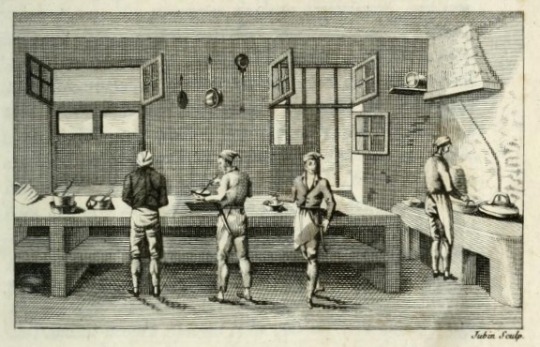
Excerpt about the role of cooks in France after the abolition of culinary guilds, and how they navigated a world which demanded for them to find new ways to stay relevant and prosperous. From Defining Culinary Authority: The Transformation of Cooking in France, 1650-1830 by Jennifer J. Davis:
French cooks sought new sites upon which to rebuild the authority of culinary labor. Throughout the early nineteenth century cooks increasingly adopted scientific terms to demonstrate their reliability and profound knowledge of the culinary arts. Such language communicated the author's education and distinction, just as an appeal to an elite patron had done in the 1660s and referral to a cook's professional expertise had done in the 1760s. The rhetoric and institutions of scientific knowledge also provided a means of distinguishing men's work from women's in the post-revolutionary era. During the early nineteenth century, cooks' claims to scientifically valuable savoir-faire rested on three crucial points of culinary innovation: food preservation, the improved production of bouillon, and gelatin extraction.
As these processes left the realm of traditional knowledge and became sites of scientific inquiry by tradespeople and amateurs alike, cooks sought to maintain authority in this arena by including scientific terms and theories in cookbooks, advertisements, and government petitions.
Two factors encouraged cooks' claims to scientific knowledge during this era. First, when Napoleon Bonaparte took the reins of government as first consul in 1799 and established himself as emperor in 1804, he raised medical doctors and academic scientists, Idéologues, to positions of political prominence. From these posts, the Idéologues subsidized experiments and inventions deemed useful to the nation and encouraged the popularization of science in the public sphere through state sponsorship of exhibitions and print forums. The Idéologues particularly supported research related to food preparation and preservation that might benefit France's armies and navies, with obvious benefits for professional cooks. Many cooks presented their particular techniques to the government during this time, seeking both financial recompense and public acclaim. Second, a voluntary association closely allied with the Idéologues' vision, the Société d'encouragement pour l'industrie nationale (Society for the Encouragement of National Industry), provided a forum in which formally trained scientists, politicians, merchants, artisans, and curious educated men might unite to address questions that inhibited French science and industry.
Together, these men sought to develop a more coherent program for industrial advancement than any one group could achieve independently. The society explicitly sought to join scientific knowledge to artisanal practical expertise, recognizing that each group had strengths that would benefit industrial development. This association invested heavily in three diffuse projects that eventually infused the most basic culinary processes with scientific awareness: new methods of food preservation to benefit the nation's armies and navies, new methods of stock preparation to sustain the nation's poor, and new methods of extracting gelatin from bones to improve hospital and military diets at little added expense.
#Illustration from L'art du Cuisinier by Antoine Beauvilliers (1814)#Defining Culinary Authority: The Transformation of Cooking in France 1650-1830#Jennifer J. Davis#David#citizen cooks#napoleon#napoleon bonaparte#napoleonic#napoleonic era#first french empire#french empire#19th century#french revolution#cooks#food#culinary history#france#1800s#history#french history#Antoine Beauvilliers#Beauvilliers#Society for the Encouragement of National Industry#Société d'encouragement pour l'industrie nationale
28 notes
·
View notes
Text
GOT THE JOB!
AND I'M BACK NOW!

I'll be an Environment Concept artist again. And this is a test task I've done between three job interviews for this new company x) It wasn't easy, but it was worth the efforts. So I made it... in about 8 days. An industrial harbour town from 19th century set in Russian Empire. Oof, it took lots of research in a very small amount of time. It's done in 3d with Blender and then in Photoshop.
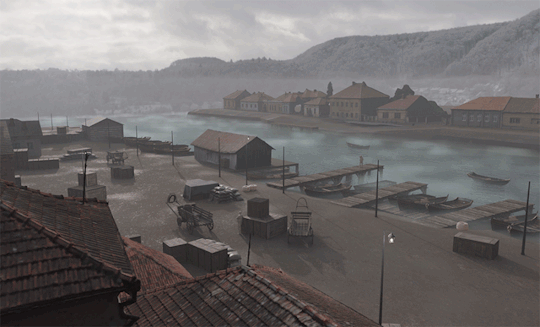

And now I have time to rest before starting going to a new job since December x')
I was so burn out for these 27 days run of the whole process I feel creative again only now x')
Now back to comic! FINALLY, GOSH!
#my art#my post#environment concept#game concept art#concept art#concept#harbour town#siberia#19th century#russian empire#history#port#industrial town#horse carriage#river#early morning#pier
47 notes
·
View notes
Text
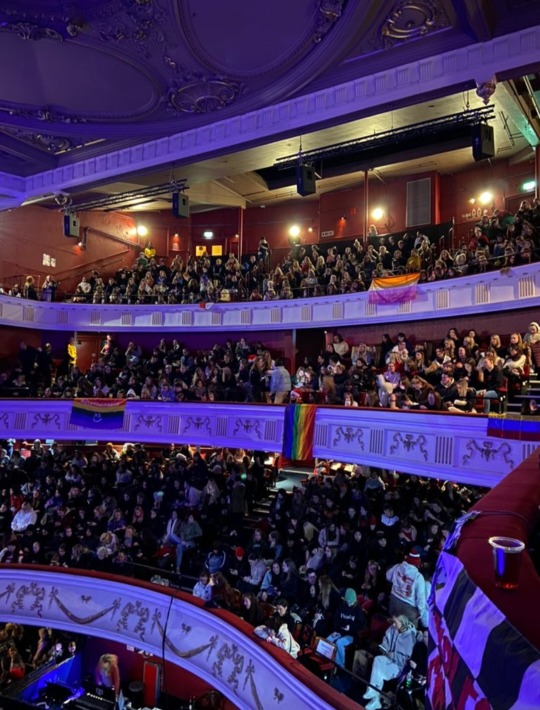
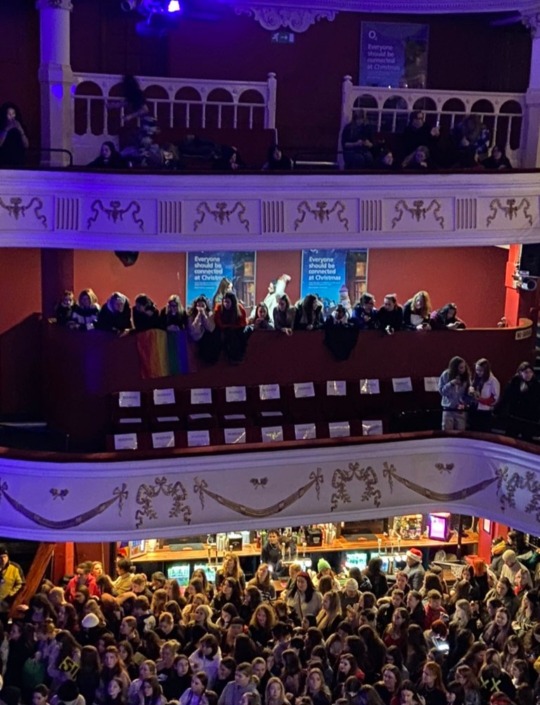

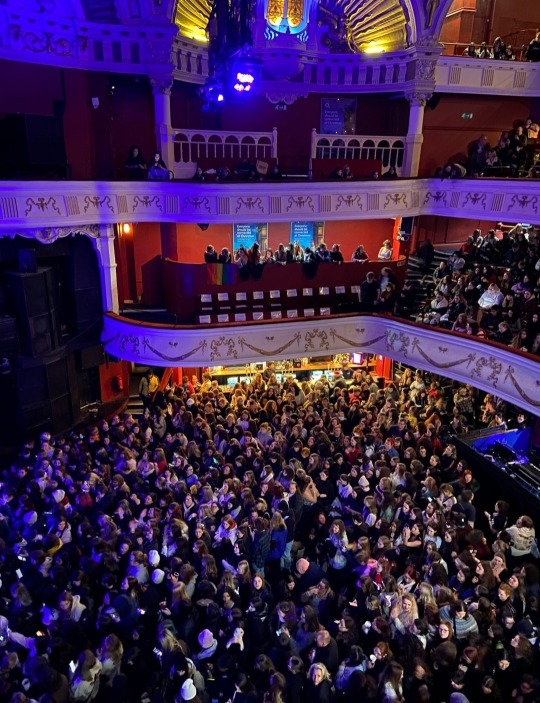

Inside the O2 Shepherd's Bush Empire [London, 12.14.22]
#venue#o2sbe#o2 shepherds bush empire#fitf ono london#12.14.22#rainbow flag#my repost#do you think the reserved seats are just family and friends or also the writers he worked with or industry people ?
276 notes
·
View notes
Text
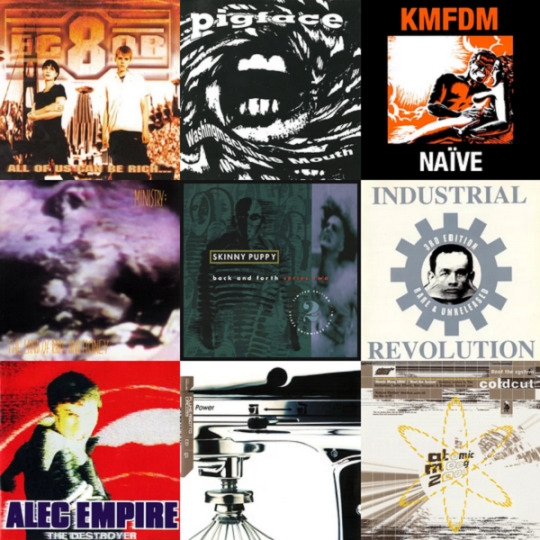
I was getting deeper and deeper into everything electronic and industrial, all during my one-year break in-between the Brentwood era and community college. The UK electronics invasion, MTV's Amp, and Wipeout XL were the major influences that led me to that point. I was starting to have an endless appetite for music, and one thing I learned about myself that I could be interested in anything and everything. I already had an affinity to golden-era hip-hop / rap and alternative. The seeds of hardcore started to grow, so there would be no stopping me at this point. There were so many genres, artists, and sounds I was getting into, and I wanted to keep up. I had a position at a department store in the shopping mall, then later at a movie rental store, so I could afford to buy titles for whatever cash I had in hand.
I didn't have a desktop with internet to find independent stores. I had yellow pages instead: thick phone-books listing hundreds upon hundreds of pages of local businesses, their addresses, and their phone numbers all in minuscule print. That's how I discovered them back then. It was a year after visiting my first-ever independent record store, Commack's Mr. Cheapo's. Then came West Babylon's Looney Tunes before the holidays. Still enthusiastic in discovering the vast unknown, I wanted to find more. Port Jefferson's Music Den would be the next destination.
I already felt like an outsider when I arrived on campus. It was a different type of demographic I was used to. I looked around and I'd still see cliques, circles, and other "exclusive" groups of students that I felt I wouldn't be included in. I'd meet newfound friends who'd introduce me to their friends, but it felt forced, and they didn't seem to care. I was crazy for Atari Teenage Riot because they showed me exactly what techno always should've been: deafening loud, criminally high-speed, and maniacally all over the place. I tried looking for people who were in them, and observed what types of music the majority were into. Simplistic, manufactured, predictable dance hits. Boring weekend club-mashers. Formulaic radio chart-toppers. I wasn't impressed. The people who were into that were shallow, superficial, judgmental, needlessly competitive, and at times just unnecessarily mean. Drama artists and attitude jockeys all over the place. That's why they called community college "13th Grade". Now you'd see the disgusting distaste of the late-Nineties music scene I had. But, I did have a couple of good cards given to me. I joined the campus newspaper which I'd write music reviews for. An attractive brunette, Sandra, randomly stopped me to strike up a conversation, and wanted to get to know me better. She was also a Jesus freak. I also made another friend I met on campus who decided to set me up with an Irish blonde acquaintance of his, and we hit it off right away. Even then, I'd deal with constant games, rudeness, and random acts of ego during my time there.
The newspaper meeting ended one late October Thursday night. I finally had the opportunity to drive out eight miles from campus to the Port Jefferson Music Den for some shopping. I walked right in, and started digging. I'm not even there for two minutes and I already find gold: the import version of Alec Empire’s The Destroyer for only $9.00 used ($22.00 brand new otherwise). That was a huge deal for me because (once again) I was an Atari Teenage Riot / DHR fanatic. Right after that? Another label release, this time from EC8OR. I'd finally discover all those artists I heard about on the internet; thirty-minute download times of grainy 480P-resolution video and all. I was really starting to like this place.
I start scouring the used CD bins, and I’d stumble upon KMFDM’s banned version of Naive for $8.00 - back when used copies on eBay were selling for…$80.00 each! Then came Pigface’s Washingmachinemouth and Ministry’s The Land Of Rape And Honey for a few dollars used. I copped Fluke’s Risotto because of Wipeout XL, and I’d snatch Skinny Puppy’s Back & Forth Volume 2 and Cleopatra’s Industrial Revolution: Third Edition, all for regular price. Finally, Coldcut’s "Atomic Moog 2000" / "Reboot The System": the first-ever multimedia CD I'd ever own.
Minute-by-minute, I'd slowly discover all sorts of wild and unusual sounds and artists they had on the racks. The Port Jeff- Music Den carried all the rare, unusual, and obscure stuff no other store on the island did. Sure, there were plenty of used CDs and vinyl bins in pop, metal, alternative, shoegaze, indie, hip-hop, and jazz. It was their industrial, noise, electronic, and experimental selections, however, that would be the all-important tie-breaker. They had all what I was looking for. I remembered seeing titles like Gescom’s Minidisc on the racks, Coil’s “Autumn Equinox: Amethyst Deceivers” 7", tons of Clock DVA, Controlled Bleeding, plus some Oval and Microstoria albums. It was wild. I felt stimulated because I found plenty of abnormalities that I never knew existed, instead of the expected, typical, calculated fare that did absolutely nothing for me.
90 minutes later, I took my short stack of CDs, placed them on the counter to be rung up, cashed out, and wrapped up what would be my first visit to The -Den. $82.00 later, I leave fucking satisfied.
With each visit after, I’d continue to score big victories where I’d find them. They were Phil Western’s debut album The Escapist, Muslimgauze’s Hamas Arc, Mike & Rich’s Expert Knob Twiddlers, Aphex Twin’s Analogue Bubblebath 3, Merzbow’s Pulse Demon, and Sam & Valley. I’d nab more DHR albums from 16-17, Shizuo on vinyl, Fuck Step '98, Give Up on 12", and Alec Empire’s Squeeze The Trigger. The best? Autechre / Gescom’s “Keynell” 12" that I found under the vinyl bins and hidden inside the cabinet underneath. It was stickered for $17.00 - another record where second-hand copies sold on eBay for $125.00. I also managed to pick up a few of their 12" EPs, mainly Chiclisuite and Envane.
All these finds made The -Music Den the most unforgettable store I had the privilege to visit. They were like nothing else on the island. Sadly, they closed down after the turn of the millennium, and no store that came after was half-as-good enough to fill the hole they left behind. Believe me, if any of you reading this would’ve shopped there, you’d feel amazed and blown away like I was. I’d still have a tough time dealing with all the constant, petty drama on campus over the next couple of years. At the Port Jefferson Music Den, however, I knew that was a place where I felt like I’d belong.
#omega#our lady omega#personal#Long Island#Alec Empire#EC8OR#Pigface#KMFDM#Ministry#industrial#electronic#techno#Cleopatra#Skinny Puppy#Fluke
49 notes
·
View notes
Text
Ateez - Character Concept
Lore: 'An Empire of Dreams and Illusions'
[faerie prince!ateez au]

[Name/Titles]
Kim Hongjoong
Prince of Light
[Kingdom]
Kingdom of Scorpio
[Cities]
Antares (Capital)
Acrab
Jabbah
Schubba
Sargas
[Sea]
The Topaz Sea
[Animal Form]
Lion
[Court members]
Got7 (Jaebeom as Right Hand, Yugyeom as Captain of Guard)
Red Velvet (Seulgi as Head Healer)
[Powers]
Bending light
Burning with light
Great affinity for healing
Only magic to break through illusions
'Unheal'
[Appearance]
Ginger hair
Blue eyes
Translucent orange wings

[Name/Titles]
Park Seonghwa
Prince of Dark
[Family]
Princess Yena of Space (soulmate/wife)
[Kingdom]
Kingdom of Aries (State- Hamal)
[Cities]
Hamal (Capital)
Bharani
[Sea]
The Diamond Sea
[Animal Form]
Wolf
[Court members]
Seoho/Jinki (ex-Right Hand)
Exo (Kai as Captain of Guard)
(G)I-dle (Soyeon as Right Hand, Miyeon as Head Healer)
[Powers]
Bending dark
Blinding with darkness or increasing vision when dark
Penetrating mind
Accessing memories
Nullifying most magics
[Appearance]
Dark hair
Grey eyes
Translucent silver wings

[Name/Titles]
Jeong Yunho
Prince of Water
[Kingdom]
Kingdom of Aries (State- Sheratan)
[Cities]
Sheratan (Capital)
[Sea]
The Diamond Sea
[Animal Form]
Sea Dragon
[Court members]
The Rose (Woosung as Head Healer)
Itzy (Ryujin as Right Hand, Yeji as Captain of Guard)
[Powers]
Bending water
Altering water bodies
Controlling temperature of water
Element of ice
Accessing memories through water bodies
[Appearance]
Strawberry blonde hair
Dark brown eyes

[Name/Titles]
Kang Yeosang
Prince of Spirit
[Family]
Princess Yena of Space (twin-sister)
[Kingdom]
Kingdom of Gemini (State- Pollux)
[Cities]
Mebsuta (Capital)
Makbuda
Propus
Pollux
[Sea]
The Pearl Sea
[Animal Form]
Meerkat
[Court members]
BTS (Namjoon as Right Hand, Taehyung as Captain of Guard)
Mamamoo (Solar as 'Left Hand', Hwasa as Head Healer, Wheein as Vice Captain of Guard)
[Powers]
Detection of living souls
Ruler of the 'Other' Dimension where spirits dwell
Portals
Ability to kill a spirit so it ceases to exist from every plane
Astral Projection
[Appearance]
Platinum blonde hair
Grey eyes

[Name/Titles]
Choi San
Prince of Earth
[Family]
Princess Gaeul of Underworld (soulmate)
[Kingdom]
Kingdom of Cancer
[Cities]
Altarf (Capital)
Arkesh
[Sea]
The Ruby Sea
[Animal Form]
Fox
[Court members]
Seventeen (Dokyeom as Right Hand, Mingyu as Captain of Guard)
Twice (Jihyo as Head Healer)
[Powers]
Bending earth and the elements within
Altering landscapes and geography
Great affinity for healing- mostly soothing purposes
Commanding animals
[Appearance]
Dark hair with ash ends
Dark brown eyes

[Name/Titles]
Song Mingi
Prince of Fire
[Kingdom]
Kingdom of Leo
[Cities]
Regulus (Capital)
Algieba
Denebola
[Sea]
The Turquoise Sea
[Animal Form]
Salamander
[Court members]
Day6 (Jae as Right Hand, Wonpil as Head Healer)
Blackpink (Lisa as Captain of Guard)
[Powers]
Bending fire
Controlling the temperature of fire
Extracting lava from earth
Detecting burning souls (either from magic or sth else)
Seeing through masking magic and illusions
[Appearance]
Red hair
Dark brown eyes

[Name/Titles]
Jung Wooyoung
Prince of Air
[Kingdom]
Kingdom of Sagittarius
[Cities]
Rukbat (Capital)
Ascella
Nunki
Kaus Medionalis
[Sea]
The Peridot Sea
[Animal Form]
Hawk
[Court members]
Stray Kids (Changbin as Captain of Guard)
Dreamcatcher (Siyeon as Right Hand, Jiu as Head Healer)
[Powers]
Controlling the element of air
Controlling properties of air
Altering weather
Detecting the presence of life
Tracing whereabouts of something/someone from scent
[Appearance]
Dark hair with streaks
Dark brown eyes
Translucent silver wings

[Name/Titles]
Choi Jongho
Prince of Nature
[Kingdom]
Kingdom of Libra
[Cities]
Zubenelgenubi (Capital)
Zubenelschemali
Zubenelakrab
[Sea]
The Opal Sea
[Animal Form]
Bear
[Court members]
Monsta X (Jooheon as Right Hand, Hyungwon as Head Healer, Changkyun as Captain of Guard)
Gfriend (Sowon as High Healer)
[Powers]
Controlling element of nature
Maintaining harmony and balance in nature
Command over life forms
Meditative state allows him to connect with nature on another level
Great affinity for healing
Can 'breathe' life into things (unpractised)
[Appearance]
Dark brown hair
Dark brown eyes
#not me bringing the entire kpop industry in this lore#fic: take me home#fic: horizon#lore: an empire of dreams and illusions#ateez headcanons#ateez scenarios#ateez au#ateez imagines#ateez x reader#ateez angst#ateez fluff#ateez smut#ateez#choi san x reader#park seonghwa x reader
46 notes
·
View notes
Text
Predictably bringing things round to Star Wars but. Overall I enjoyed Andor a lot, right? Specifically relevant to this conversation, it was more politically interesting and incisive than I generally expect from Star Wars and certainly from Disney.
And they came so close to doing it right. Poor Bix saying You're not going to believe me anyway, are you? Dedra acknowledging that no, she isn't going to trust any information that hasn't been obtained via torture. Which tells you everything you need to know about ISB and/or Imperial ideology. Which is chilling and realistic.
And then they immediately RUIN it, with improbably-high-tech sci-fi torture that is not only infallible in the minds of the ISB (ideology is a hell of a drug), but genuinely successful at eliciting information in-narrative.
Compare this to the OT's treatment of torture with Leia lying through her teeth to Tarkin and Vader, or Han mumbling They never even asked me any questions.
Idk I just. Think a lot about the difference 40-odd years makes.
#various eu authors have attempted to reframe leia's response to torture as evidence that she is Super Special And Strong In The Force#they are all unkindly invited to fuck off and read a book about how torture. doesn't. fucking. elicit. good. intelligence.#anyway it's wild that cultural conversations on this subject have been so poisoned that even comparatively NON-brainless fiction#can't manage to exceed the bar of something 40 years old w political thoughts that boil down to Evil Empire Is Evil#star wars#andor#culture industry stuff#cw torture#my posts
48 notes
·
View notes
Text

Assassin’s Creed: Revelations (2011)
#2011#gaming#concept art#Assassin’s Creed#Revelations#Ezio#Ezio Auditore da Firenze#Altair#Altair ibn La'Ahad#Desmond Miles#Animus#Abstergo Industries#Masyaf#Constantinople#Istanbul#Ottoman Empire#Byzantium#Byzantine Empire
10 notes
·
View notes
Text
Do you like Atlantis? Do you have a LinkedIn?
Find Marcelo Vignali, for legit Atlantis development renderings that didn't make the final cut into the movie.
He also has purchaseable videos on his work on the movie...
#marcelovignali#atlantis the lost empire#i would link it but#im a professional with 3rd connections in the industry and i dont want to cause a sacred artist any trouble or fandom crackhead rampages#why does sesshomaru keep popping up as rec tag tumblr why#bruh i bet paolini knew vignali before writing eragon book 3 or 4#ramblings#im following this guy
8 notes
·
View notes
Text
Industry and Empire, Chapter 1 - Britain in 1750
Introducing us to Britain in 1750, Hobsbawm gives contemporary tourists' contrasting descriptions of London as the biggest city in Christendom, versus the green and orderly countryside. Our tourist can't visit any comparable cities in England but Bristol, Liverpool and Glasgow are rapidly growing due to a burgeoning trade in slaves and colonial commodities.
Britain has 6000 mercantile ships with tonnage of half a million, nearly 6 times bigger than its nearest rival, France. This private merchant's fleet forms 1/10 of all fixed capital investment, with 100,000 seamen forming the largest group of non-agricultural workers. There is some machinery, basic lifts and steam engines, but was the country was better known for artisan manufacturing.
The overall impression is of a powerful, rich country, based on commerce and its navy, with a comparatively prosperous common people.
"Economic and technical progress, private enterprise, and what we would now call liberalism: all these were evident. Yet nobody expected the imminent transformation of the country by an industrial revolution -- not even travellers who visited Britain in the 1780s, when we know it had already started."
Importantly, Britain also had a national "monetary and market economy", with London providing a giant internal market for agricultural products and coal, little regional variation in prices, and a lack of famine outside of the Scottish Highlands and Ireland
There was little peasantry in the sense of small cultivators, villages had a cash economy with consumption of colonial goods like tea and tobacco, and land ownership was largely concentrated: "a few thousand landowners, leasing their land to some tens of thousands of tenant farmers, who in turn operated it with the labour of some hundreds of thousands of farm labourers..."
Manufacturing was largely rural, with villages starting to specialize in certain artisanal crafts. This meant that the big landowners had a direct interest in the mines and manufactures on their lands, and thus industry had a major influence on domestic politics in comparison to commerce, unlike the situation in other European countries
The British ruling class, due to the influence of the English Civil War, was much more interested in austere money-making compared to the more archaic and feudal aristocracy of the Continent, allowing them to adapt better when things did change.
A lot of what Hobsbawm is pointing to here -- the condition of town and country, the relative balance of industry and commerce, the concentration of land, and the essentially bourgeois nature of the aristocracy are all this that are about to rapidly change, or are relevant for understanding the politics of what is to come.
One thing I really like is Hobsbawm explaining the preconditions for the Industrial Revolution in fundamentally economic terms of land and production, and their attendance social relations, without too much appeal to national character or a kind of pure contingency. Those show up -- they aren't irrelevant -- but they play a mediating role rather than a basic one.
This is a short chapter, so I really need to improve my summarizing.
0 notes
Text
Had it not been for the steady stream of cheap raw cotton flowing out of the New World (which supplied nearly three-quarters of Britain’s imports of raw cotton), the British cotton industry would have never been able to play such a central role in Britain’s industrialisation. As David Washbrook notes, ‘[c]otton was exceptionally well-placed to lead the move towards mechanization: but favourably placed precisely because its raw material came from abroad’. That the British were able to outsource the production of raw cotton to the Americas – where the costs of production and labour in particular were considerably lower – was central to their industrial takeoff in the 18th century. Through the institution of the slave plantation in the colonies, capitalists were able to significantly reduce the costs of constant capital in the form of raw materials. Without this key input, it is highly unlikely British manufactures could have overcome the formidable competition from Indian cotton textiles, which even in the mid-18th century still held a leading position in world markets. The ‘workshop of the world’ was thus built on the foundations of plantation slavery.
Alexander Anievas and Kerem Nişancıoğlu, How the West Came to Rule: The Geopolitical Origins of Capitalism
105 notes
·
View notes
Photo

Goods production in the Roman Empire.
by @Al_Stoyanov
136 notes
·
View notes
Text
Napoleon’s decree in 1810: First regulation limiting pollution in French history

Source: Décret impérial du 15/10/1810
This comes after the creation of the Public Hygiene and Health Council of the City of Paris on 6 July 1802, and each department getting its own Health Council.
In addition, the ordinance of the Prefect of Police on 12 February 1806 concerning preliminary investigations then authorization necessary for factories, workshops and laboratories producing polluting or dangerous products.
According to Éloi Laurent (Towards Social-Ecological Well-Being):
“The first laws regulating French industrial establishments and in particular the imperial decree of October 15, 1810 was the first legislation in the world regulating pollution (it was extended by the law of December 19, 1917).”
Below is an English translation of the 1810 decree.
————-
Imperial decree of 10/15/1810 relating to factories and workshops that emit an unhealthy or inconvenient odor.
NAPOLEON, Emperor of the French, King of Italy, Protector of the Confederation of the Rhine, Mediator of the Swiss Confederation;
On the report of our Minister of the Interior;
Considering the complaints brought by various individuals against factories and workshops whose operation gives rise to unhealthy or inconvenient exhalations;
The report made on these establishments by the chemistry section of the physical and mathematical sciences class of the Institute;
Our Council of State heard;
We HAVE DECREED and DECREE the following:
Article 1 of the decree of 15 October 1810
As of the publication of this decree, factories and workshops which emit an unhealthy or inconvenient odor may not be formed without permission from the administrative authority: these establishments will be divided into three classes.
The first will include those who must be located away from private homes.
The second will include factories and workshops whose distance from homes is not strictly necessary, but which should only be set up once it is certain that the operations carried out there will not inconvenience or cause damage to neighboring homeowners.
In the third class will be establishments which can remain near homes without inconvenience, but must remain subject to surveillance by the police.
Article 2 of the decree of 15 October 1810
The necessary permission for the formation of factories and workshops included in the first class will be granted, with the following formalities, by a decree issued by our Council of State.
Permission for the operation of establishments in the second class will be granted by the prefects, on the advice of the sub-prefects.
Permissions for the operation of establishments in the last class will be issued by sub-prefects, who will first obtain the opinion of the mayors.
Article 3 of the decree of 15 October 1810
Permission for first class plants and factories will only be granted subject to the following formalities:
The request for authorization will be presented to the prefect, and posted, by his order, in all communes within a five kilometer radius.
Within this period, any individual will be allowed to present grounds of opposition.
The mayors of the communes will have the same right.
Article 4 of the decree of 15 October 1810
If there is opposition, the Prefecture Council will weigh in, with the exception of a decision by the Council of State.
Article 5 of the decree of 15 October 1810
If there is no opposition, permission will be granted, if necessary, on the advice of the prefect and the report of our Minister of the Interior.
Article 6 of the decree of 15 October 1810
If it concerns a soude[*] factory, or if the factory is to be established within the customs area, our Director of Customs will be consulted.
Article 7 of the decree of 15 October 1810
Authorization to form factories and workshops in the second class will only be granted after the following formalities have been completed.
The entrepreneur will first send his request to the sub-prefect of his arrondissement, who will forward it to the mayor of the commune in which the establishment is to be formed; by instructing him to carry out a de commodo et incommodo[**] enquiry. Once this is completed, the sub-prefect will issue a decree which he will forward to the prefect. The prefect will make the decision, unless any interested parties appeal to our Council of State.
If there is opposition, it will be decided by the Prefecture Council, except for an appeal to the Council of State.
Article 8 of the decree of 15 October 1810
Factories or establishments in the third class can only be formed with the permission of the Prefect of Police, in Paris, and the mayor in other towns.
If complaints arise against the decision taken by the Prefect of Police or the mayors, on a request to form a factory or workshop included in the third class, they will be judged by the Prefecture Council.
Article 9 of the decree of 15 October 1810
The local authority will indicate the place where the factories or workshops included in the first class may be established, and will specify its distance from private dwellings. Any individual who carries out construction in the vicinity of these factories and workshops after their establishment has been authorized will no longer be allowed to request their removal.
Article 10 of the decree of 15 October 1810
Establishments that emit an unhealthy or inconvenient odor will be divided into three classes in accordance with the table appended to this imperial decree. It will serve as a rule whenever it comes to deciding on requests for the formation of these establishments.
Article 11 of the decree of 15 October 1810
The provisions of this decree will not have retroactive effect: consequently, all establishments currently in operation will continue to operate freely, with the exception of any damages to which contractors may be liable in the event of damage to the property of their neighbors; such damages will be settled by the courts.
Article 12 of the decree of 15 October 1810
However, in the event of serious inconvenience for public health, culture, or the general interest, first-class factories and workshops causing such inconvenience may be suppressed by virtue of a decree issued by our Council of State, after having heard the local police, taken the opinion of the prefects and received the defense of the manufacturers.
Article 13 of the decree of 15 October 1810
Establishments maintained under article 11 will cease to enjoy this benefit as soon as they are transferred to another location, or if there is a six-month interruption in their work. In either case, they will fall into the category of establishments to be formed, and they will not be able to resume activity until they have obtained a new permit, if necessary.
Article 14 of the decree of 15 October 1810
Our Ministers of the Interior and the General Police are each responsible for the execution of the present decree, which will be published in the Bulletin of Laws.
NAPOLEON
By the Emperor:
Minister Secretary of State,
H. B. DUKE OF BASSANO
——————
My notes:
Attached to this decree is an appendix with
“nomenclature of factories, establishments and workshops emitting an unhealthy or inconvenient odor, which may not be set up without permission from the Administrative Authority.”
Some of the substances listed can be translated and some cannot. I recommend going to the link at the top of this post to check it out if interested.
[*] Soude definition
[**] De commodo et incommodo definition
Public Hygiene and Health Council of the City of Paris is a translation of Conseil d'hygiène publique et de salubrité de la Ville de Paris
An additional source on this legislation: Fondation Napoléon
#napoleon#napoleon bonaparte#napoleonic era#napoleonic#first french empire#french empire#pollution#environment#environmental regulations#climate#industrial revolution#industrial#Napoleon’s reforms#napoleonic reforms#reforms#history#france#imperial decree#regulations#french revolution#ecology
9 notes
·
View notes
Text
i'm gonna be honest i'm so thankful that jimin's weverse post didn't include a selfie bc if i'd seen him in that fuckass uniform i'd have killed myself. that shit genuinely makes me nauseous
11 notes
·
View notes